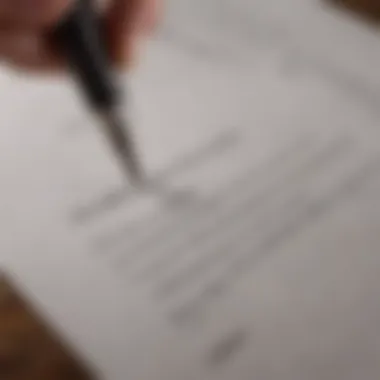Crafting an Effective Administrator Cover Letter


Intro
In the competitive landscape of administrative jobs, a well-crafted cover letter is fundamental. It acts as a bridge, connecting your qualifications and experiences to potential employers. Administrative roles require a detail-oriented approach, making it imperative that your cover letter reflects that same precision and professionalism. This article aims to guide you through writing an effective administrator cover letter, ensuring that your application stands out from the crowd.
A strong cover letter should highlight not only your skills and experiences but also how they align with the specific needs of the organization you are applying to. In the following sections, we will discuss the key components of a compelling cover letter and outline common pitfalls to avoid. By understanding the nuances of this process, you can present yourself as a competitive candidate, capable of navigating the demands of an administrative career.
Understanding the Importance
The significance of a cover letter is often underestimated, but it provides essential insights into a candidate's communication skills and attention to detail. A thoughtfully written cover letter can sometimes sway hiring decisions more than resumes do. It allows you to articulate your passion for the role and give examples of how your background prepares you for the position. Moreover, it offers an opportunity to address potential concerns or gaps in your resume.
In a sea of applicants, your letter should clearly convey why you are the ideal fit. Tailor each cover letter to the job. Highlight experiences that align closely with the qualifications listed in the job description. This tailored approach not only captures attention but demonstrates your proactive nature and strong interest in the specific role.
Framework of an Effective Cover Letter
A successful cover letter typically consists of several key sections: an introduction, a body that details your experiences and skills, and a conclusion. Each part plays a crucial role in building your case for employment. The introduction usually includes a hook that captures the reader's attention, followed by a brief mention of the position you are applying for.
The body of the letter serves as a platform for showcasing relevant experiences. This section should align closely with your resume but focus on specific anecdotes that illustrate your contributions. Conclude with a strong closing statement that summarizes your enthusiasm for the role and invites the employer to contact you for further discussion.
Common Pitfalls to Avoid
Even seasoned professionals can misstep when writing cover letters. Common issues can include:
- Sending generic letters: Failing to customize your letter shows disinterest.
- Grammatical errors: Always proofread your letter to maintain professionalism.
- Being overly verbose: Keep your letter concise and to the point.
Avoiding these pitfalls can enhance the effectiveness of your cover letter.
Tips for Success
To refine your cover letter, consider these approaches:
• Research the organization. Understanding its culture can guide your language and tone.
• Showcase relevant skills early — make them evident right from the start.
• Use active voice throughout to keep your writing direct and compelling.
Effective cover letters do not only demonstrate what you have achieved but also illustrate how these achievements position you as an exemplary candidate for the role. By following this structured guide, you can strategically craft a cover letter that significantly increases your chances of landing an interview.
Understanding the Purpose of a Cover Letter
An administrator cover letter serves several important purposes in the broader context of job applications. First and foremost, it acts as a supplementary document to your resume, elaborating on key aspects of your qualifications and experiences. By articulating specific examples of your achievements, it gives presence to the bullet points found on your resume, creating a narrative that showcases your professional journey in a thoughtful and compelling manner.
A well-crafted cover letter can also convey your personality and enthusiasm for the role. Resumes often present structured information, but a cover letter allows potential employers to glimpse who you are beyond your qualifications. This representation of your individuality can be particularly crucial in administrative roles, where soft skills, communication abilities, and alignment with organization culture are essential.
As far as benefits are concerned, there are several notable ones. A cover letter can help address gaps in your experience, explain a change in career direction, or highlight particular interests in specific roles. Here, you can express why you are drawn to the company itself, elaborating on shared values or experiences that resonate with you. Tailoring your cover letter to fit the needs of a position sends clear signals about your commitment and proactive approach.
While emphasizing the purpose of a cover letter, it’s vital to consider its limitations. A cover letter does not substitute your resume; instead, it complements its factual assertions with explanatory context. Approaching the cover letter writing process thoughtfully is essential, to ensure it adds appropriate value to your overall job application package.
What is an Administrator Cover Letter?
An administrator cover letter is a personalized document aimed directly at showcasing your readiness and eligibility for an administrative role. It complements your resume by providing context for the qualifications listed and elaborates on your tactical abilities specifically related to administrative functions like coordination, communication, and efficient organization of tasks.
Typically, this letter begins with your contact information, followed by the employer's and the date. The body should contain an introduction that specifically references the position you are applying for, with a short mention of your current situation or background as it relates to administration.
In general, administrator cover letters, just like any good cover letters, are concise yet robust. They usually do not exceed one page. On its own, this document serves the dual role of advancing your candidacy to potential employers while demonstrating your professionalism and written communication skills.


Importance of the Cover Letter in Job Applications
The significance of a cover letter in job applications cannot be overstated. It provides you with an opportunity to deliver a compelling argument for why you should be chosen for a job. Unlike other forms of communication, the cover letter is uniquely formatted to be more persuasive and narrative-based. This is your platform to narrate how the administrative roles did shape your skills or how certain experiences have armed you for future challenges.
Also, applying for roles can become more competitive than ever. Many candidates deliver stellar resumes filled with impressive credentials, so a cover letter can separate you from a pool of equally qualified individuals. Attention to detail in customs areas, closer alignment with organizational goals, and expressed professional aspirations can grab the reader's interest.
A cover letter functions as your personal brand ambassador in the application process, allowing you to stipend beyond the formal confines of a resume.
Key Components of a Strong Cover Letter
Crafting a powerful administrator cover letter requires an understanding of key components. These elements help to present qualifications in a structured manner that grabs attention. The components should not be considered mere formalities; rather, they directly impact how well a candidate’s experience aligns with the requirements of the role. A well-organized cover letter encapsulates the candidate's strengths and suitability for the job, making recruitment more efficient for hiring professionals. Each element serves a purpose that contributes to creating a coherent narrative.
Personal Information and Salutation
In the opening section of your cover letter, your personal information and the salutation are paramount. It is standard practice to place your name, address, contact details, and the date at the beginning of the letter. While this may seem basic, ensuring accuracy in your contact information is crucial. A personalized salutation addresses the reader directly, fostering a connection and reflecting interest in the position. Using the hiring manager's name, if possible, is ideal rather than a generic greeting such as "To Whom It May Concern."
Prologue and Purpose Statement
The introduction serves multiple functions. It presents the candidate and outlines the intention behind the letter. A compelling purpose statement should quickly convey the job you are applying for and express genuine enthusiasm. This is the part where candidates can set the tone. Framing the introduction effectively will lead to higher chances of engagement from the reader.
Highlighting Relevant Skills and Achievements
Skills and achievements form the core essence of the cover letter. Employers are keen to understand what makes a candidate fit for the role. Clearly outlining specific achievements, backed by quantifiable evidence if possible, provides weight to the claims made. Instead of just listing qualifications, illustrate them through experiences, demonstrating how you've contributed positively in previous roles. This method makes the narrative engaging while substantiating your relevance to the role.
Alignment with Organizational Goals
Establishing a connection between personal values and the organization's objectives is crucial. Explain how your ethos or past experiences can help the company achieve its aims. This alignment assures the hiring manager that you are not only apply for the job but also care about the organization’s future. Referencing the mission and values of the company here can accentuate this connection and underscore your potential as a team member.
Epilogue and Call to Action
Concluding your cover letter effectively could determine whether your application is taken seriously. Capitalize on this space to summarize your eagerness and reiterate your qualifications. A direct call to action such as an expression of hope to meet face-to-face imbues your closing with confidence. A well-articulated conclusion rounds up the presentation and leaves the recruiter with a strengthened impression of your candidacy.
Remember, in your cover letter, each section needs to not just exist but flow logically into the next, building a complete narrative.
Tailoring Your Cover Letter to Specific Roles
Tailoring your cover letter to specific jobs is crucial for anyone seeking an administrative position. Each job posting has unique requirements and expectations that applicants must address. By customizing your letter, you show that you have read the job description attentively and understand what the employer seeks. This strategy can make your application far more impactful.
Understanding Job Descriptions
Analyzing job descriptions requires attention. Focus on the key requirements and competencies that the employer specifies. Pay attention to not only the main responsibilities but also to the skills and experiences. Identify the trends in required qualifications that relate to your background. For example, if a job emphasizes
Common Mistakes to Avoid
An effective cover letter can distinguish a candidate from others in the job market. Understanding common mistakes can save you time and prevent your application from being overlooked. Many job seekers submit cover letters that do not present their qualifications effectively. By avoiding common pitfalls, one can enhance the likelihood of leaving a positive impression on employers.
Generic or Template-Based Letters
Using a generic or template-based letter lacks personality and connection. Employers can detect these letters easily and often view them unfavorably. A cover letter should represent your unique qualifications and interest in a specific role. Customization is vital.


To differentiate yourself:
- Personalize the content: Shift attention toward specific aspects of your background that match the job requirements.
- Reference the organization: Show understanding of the company's values, mission, or projects. A detailed connection illustrates commitment and genuine interest.
- Include specific experiences: Use concrete examples from your background relevant to the role. This clarity offers deeper insights into your capabilities.
Overly Complex Language
While it is crucial to present yourself as professional, using overly complex language can be a barrier rather than an advantage. Simplicity often conveys confidence. Excessive jargon or technical terms may lead to misinterpretation. Additionally, remarkable qualifications can be washed out by convoluted language.
Effectively maintain clarity by:
- Choosing simpler words: Clear communication ensures your points are easily understood.
- Keeping sentences brief: Short and meaningful sentences hold attention better.
- Eliminating unnecessary details: Stay focused on relevant information to keep your reader engaged.
Neglecting Proofreading and Formatting
A careless approach towards proofreading tells the employer you might not take your work seriously. Oversights will convey an unprofessional image. Poor formatting can distract from your content and lead initiatives. Presenting an organized cover letter also reflects your respect towards the hiring process.
Key considerations for a polished letter include:
- Careful review: Check for spelling and grammar mistakes that could undermine your professionalism.
- Consistent formatting: Utilize uniform fonts, sizes, and styles to create a cohesive appearance.
- Seeking external feedback: Having another person review your letter offers a fresh perspective.
Avoiding these common mistakes is fundamental to the success of your administrative cover letter. Take each potential pitfall seriously to maximize your chances in a competitive job market.
Examples of Administrator Cover Letters
Writing an effective cover letter is not simply about listing your qualifications. It serves to narrate your unique story and perspective. This section is crucial to understanding practical applications, demonstrating how to translate conceptual advice into action. Consideration of examples presents both clarity and direction for individuals preparing their own cover letters. Here, we delve into specific scenarios for various levels of experience. Each cover letter revealed illustrates opportunities for personalization and strategic alignment with job requirements.
Entry-Level Administrator Cover Letter
In crafting an entry-level administrator cover letter, an applicant should focus on transferable skills accrued through education, internships, or related volunteer work. Despite limited formal experience, new candidates can emphasize competencies developed in academic settings or through projects.
A sample structure may include:
- Debut Attraction: Start with a strong introduction. Draw attention by stating how your academic achievements or specific training align with the job requirements.
- Relevant Academic Projects: Describe projects that showcase skills such as organization, communication, or any administrative tasks.
For instance, you might say: "During my internship at XYZ Nonprofit, I developed an efficient filing system that reduced retrieval time by 20%."
- Willingness to Learn: A statement regarding your eagerness to acquire additional skills can enhance the tone of enthusiasm in the letter. Conclude by expressing motivation to join the organization and a commitment to contribute.
Experienced Administrator Cover Letter
For experienced administrators, a cover letter must communicate established expertise with supporting evidence. The focus should be on meaningful accomplishments and their impact on prior organizations.
Consider including:
- Professional Achievements: Begin by stating a significant result from past employment.
- Industry Experience: The cover letter should highlight relevant experience in the specific field. Consider providing examples that align with the specific requirements of the new job.
- For example, "At ABC Corporation, I led the onboarding initiative that increased retention rates by 15%."
Utilizing metrics in achievements adds substantial weight. Ensure to reiterate how your experiences can translate to value in the new role. Ending with a strong ask for the opportunity to discuss how experiences align specifically adds to a sense of purpose.


Cover Letter for a Specific Industry
This type of cover letter seeks to align one's competencies with industry-specific nuances. Tailoring a cover letter in this manner requires extensive research on both the role and the company. Each specific industry includes varying expectations and culture techniques, thus necessitating customization.
Key elements include:
- Identifying Unique Skills: Highlight skills directly relevant to that industry or sector of administration, focusing on qualifications mentioned in the job description.
- Align with the Company Mission: Reference the company’s culture, missions or values in your conclusion. This demonstrates that you understand what the organization stands for and that you are willing to contribute to those goals as well.
In summary, examples of cover letters for administrators serve as valuable guidance through the application process. Whether entry-level, experienced, or linked to a specific industry, these templates exhibit the essential attributes and language that resonate with hiring managers.
Final Steps in the Application Process
As you navigate the intricate landscape of job applications, the final steps are crucial. Completing an effective cover letter is only part of the process. The actions you take post-application can significantly influence your success. These steps enhance your chances of moving forward in the hiring journey.
Follow-Up Strategies
Once you have submitted your cover letter and resume, consider a strategic follow-up. This action shows your genuine interest and commitment to the position. Here are some key strategies:
- Timing is Important: Wait about one week after you submit your application before following up. This gives the employer some time to review applications.
- Craft a Thoughtful Email: Express appreciation for the opportunity to apply and reemphasize your interest in the role. Highlighting how your skills align with the position can once again bring attention to your suitability.
- Be Professional: Your email should have a formal tone and a clear subject line, such as Follow-Up on [Your Name] Application for [Position].
Care should be taken not to appear pushy or impatient. Balance is key. Too many follow-ups can be off-putting, whereas a lack of communication might imply disinterest.
Maintaining effective follow-up communication can reaffirm your candidacy and distinguish you among other applicants.
Preparing for Interviews
When you receive an interview invitation, preparation becomes your next focus. An interview is a critical opportunity to showcase your qualifications and the effectiveness of your cover letter. Here are some important aspects to consider:
- Research the Organization: Understand the company's mission, values, and recent achievements. Tailoring your responses to reflect their goals can demonstrate alignment. Familiarity with current events related to the organization is also beneficial.
- Practice Common Questions: Prepare for typical interview questions such as eligibility. Ask a friend or use online resources for practice. During conversation, remember to concisely articulate relevant experiences.
- Prepare Insightful Questions: Interviews are two-way conversations. Formulate questions to both show interest and gain information about the role and the company. Asking how the position fits within the organization's growth plans shows your anticipation about contributing.
- Professional Attire: Choose clothing that aligns with the company culture. This representation conveys respect and your understanding of professional norms.
Additionally, remember to have copies of your cover letter and resume, as interviewers may reference these documents during your discussion. This preparation will help reinforce your candidacy as you present your qualifications.
Resources for Further Reading
Exploring further resources on the art of crafting an effective cover letter is essential. Such resources offer additional insights and practical guidelines, helping candidates refine their skills. This does not only enrich the overall job application but also strengthens personal and professional growth. By understanding various aspects of administrative roles and covering letter strategies, candidates make themselves more marketable.
Books on Professional Development
Books focused on professional development are significant sources of knowledge. They can guide you through various methodologies and techniques. Reading targeted literature not only educates you but also inspires confidence in your abilities. Here are some recommended titles:
- Cover Letter Magic by Wendy S. Enelow and Louise M. Pennington. This book provides insights on crafting compelling cover letters tailored to specific job applications.
- What Color Is Your Parachute? by Richard N. Bolles. While primarily about job hunting, this book offers excellent tips on self-presentation, including cover letters.
- The 7 Habits of Highly Effective People by Stephen R. Covey. Though not solely about cover letters, the principles outlined can enhance your approach to professional correspondence.
These readings can serve as a foundation not only for the immediate task at hand but also for long-term career strategies. They present powerful tools to enhance effectiveness, maintain professionalism, and demonstrate a capacity for growth. Such reading habits cultivate a mindset focused on continuous self-improvement.
Online Courses and Workshops
Online courses and workshops can provide practical training for those who benefit from structured learning environments. They serve as an avenue for engagement with experienced professionals and peers. Platforms such as Udemy, Coursera, or LinkedIn Learning offer a plethora of courses on effective writing and career advancement.
Some beneficial courses can include:
- Writing a Cover Letter: Getting Started on Udemy. This course focuses on essentials, empowering participants to construct clear and appealing cover letters.
- Personal Branding for Career Success on Coursera. This workshop elaborates on personal branding, ultimately enhancing the appeal of one’s cover letter.
- Effective Communication Skills on LinkedIn Learning. This course aids in mastering words to convey intentions more effectively. By enhancing communication clarity, professionals position their cover letters positively.
Online resources complement your knowledge with interactive elements, making learning engaging and applicable.
By actively participating in these courses and workshops, individuals can gather fresh perspectives, share annotations, and learn collaboratively. These platforms typically allow interaction between students and instructors, increasing the likelihood of gaining direct feedback regarding cover letter strategies.
In summary, the critical application of various resources extends beyond basic understanding. They represent vehicles for effective communication and enhanced employability through superior cover letter creation.



